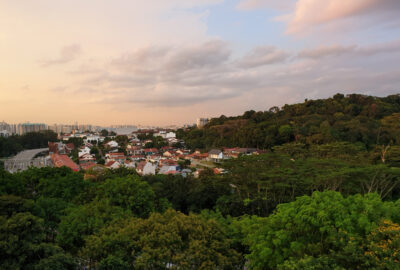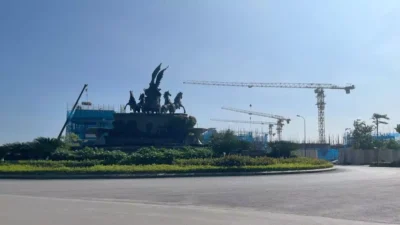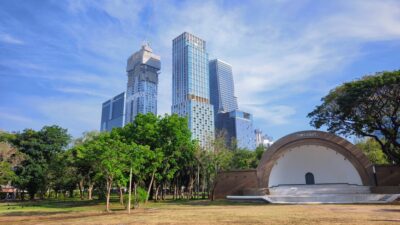Singapore’s premium rental segment at risk with the pandemic-induced departure of expats
With Singapore’s economy in its worst shape since the Global Financial Crisis, there are signs that its status as a hub for expatriate workers may be threatened

When Cécile swapped Canada for Singapore last November, she found apartment hunting to be a much smoother experience than during her previous stint in the Lion City four years earlier.
“Agents showed me a lot of downtown options, including larger family-style units, many of which were newer, cheaper and kitted out with better amenities and fittings than when I was looking in 2017,” says the epidemiologist, who didn’t want to give her full name.
Singapore has long been one of the most alluring Asian bases for foreign professionals. Low tax rates, high quality of living, and a largely English-language business landscape have all contributed towards the Little Red Dot’s big appeal for decades.
Non-residents currently comprise almost 29 percent of the country’s 5.69-million population, while there are about 521,000 permanent residents—foreigners permitted to live, work, study and retire without any time limit—according to the latest government data. There are, however, signs that the sun may gradually be setting on its reputation as a welcoming haven.
As it has the world over, the pandemic has shattered Singapore’s short-term economic outlook. In January 2021, the country fell into recession for the first time since the Global Financial Crisis, recording a year-on-year economic decline of 12.6 percent in 2020.
Unemployment, meanwhile, increased by 0.7 percent during the same period to a decade-high of 4 percent. The Ministry of Manpower (MOM) noted in December that foreign professionals accounted for almost 90 percent of employment contraction in the first three quarters of 2020, with many others taking pay cuts.
Loss of income for the relatively wealthy expatriate segment may seem trivial within the wider context of the population’s pandemic woes, but there are concerns it may pre-empt an exodus of sorts, especially when combined with the introduction of stricter foreign employment laws and rising anti-foreigner sentiment.
Contributors to the country’s occasionally vitriolic online blog sites often complain that foreigners—or ‘ang mo’ as the white population is often derogatorily called—are taking jobs that locals could do equally as well. Minister of Foreign Affairs Vivian Balakrishnan stoked the fire in a televised election debate last July when he said “the only reason we have foreigners here is to give an extra wind in our sails when the opportunity is there. Now we are in a storm, and we need to shed ballast.”
The statement was made off the back of the government’s decision to increase the minimum monthly salary required to apply for an employment pass to SGD4,500 (USD3,400) and again to SGD5,000 for the financial services sector in December. A MOM statement noted that the threshold for “older and more experienced candidates in their 40s”, meanwhile, is now about twice the monthly minimum.
“There have been a few instances of candidates at the company I work for not receiving their employment passes, but I’m fairly lucky as I’d already lived here and so the process was easier,” Cécile said. “I’ve also seen quite a few friends lose jobs and leave since I returned, while others have had to downsize their apartments.”
She added that she quickly settled on a two-bedroom unit in an older building within the Core Central Region (CCR), the most popular location for expatriate tenants. Cécile even managed to negotiate 20 percent off the initial asking price on the proviso she signed a two-year tenancy agreement. “It was pretty clear that the landlord wanted somebody in as quickly as possible and for as long as possible,” she said. “He mentioned that the apartment had never been vacant for this long before.”
The vast majority of Singaporeans and permanent residents tend to take advantage of the availability and affordability of Housing Development Board properties, so the prime rental market has long relied on the small, yet significant, wealthy expatriate population. And while the relative dearth of foreign tenants has arguably provided those returning or relocating within Singapore with improved options, it also raises questions about the long-term stability of Singapore’s premium rental market.
Investors and real estate agents that focus on the premium rental segment, as opposed to property developers, would be hit hardest by any significant departure of foreign professionals.

But while prime rents declined by 2.4 percent through 2020, according to real estate consultancy Knight Frank Singapore, consolation was that only 3,433 new private homes were completed island-wide, the lowest number in more than a decade.
Knight Frank Singapore stated that attrition of foreign professionals contributed towards occupancy rates in the CCR falling 4.1 percent to 89 percent last year, emphasising that “these levels are still fairly healthy for a nation currently in economic recession and an ongoing battle with Covid-19.”
Most economists agree that the recession will be short-lived. Singapore is expected to recover in the next quarter, thanks to its relatively positive handling of the pandemic and perennial status as an international hub. There is also optimism that the overseas employment restrictions will create opportunities for a greater Singaporean presence within the upper echelons of sectors such as financial services while diversifying the economy to focus more on future industries such as digital finance, electric vehicles and medical technology.
“These would all require a broad base of international talent as the population base in Singapore is ageing and the talent pool is limited to feed the growth needed in these new advanced technologies,” says Benedict Lim, partner at Ernst & Young and the firm’s managing director of ASEAN Real Estate.
The only real impact Lim sees this having on the rental market, however, is a shift in demand towards smaller units. “The foreign talent characteristics will change from experienced senior talents who typically come with family to a younger talent pool of technology savvy experts who typically are younger, single and relocate without family.”
Even with the tightened employment restrictions, the recent decline in CCR occupancy, and mixed messages from local politicians, the departure of a few hundred thousand foreign professionals looks unlikely to upset the premium rental market in the long term. Meanwhile, there is every chance that the expatriate population—albeit with fewer middle-aged bankers—will soar again as the Lion City clears its throat for another roar.
The original version of this article appeared in Issue No. 165 of PropertyGuru Property Report Magazine
Recommended
Meet the expert helping overseas investors crack Australia’s property market
Ivan Lam of property advisors Charter Keck Cramer helps clients navigate Australia’s complex real estate dynamics
6 spots to check out in Singapore’s Bukit list neighbourhood
The sought-after Singapore neighbourhood offers lifestyle amenities, green space, and new residential projects
Thailand’s real estate sector watches closely as the Shinawatras return to power
Time will tell if the return to power in Thailand of the Shinawatras will lift the country’s ailing real estate sector
China’s homebuying surge: Can new stimulus measures keep the market rally alive?
Stimulus measures have sparked a surge in homebuying activity around China, but many are sceptical the shift will endure








